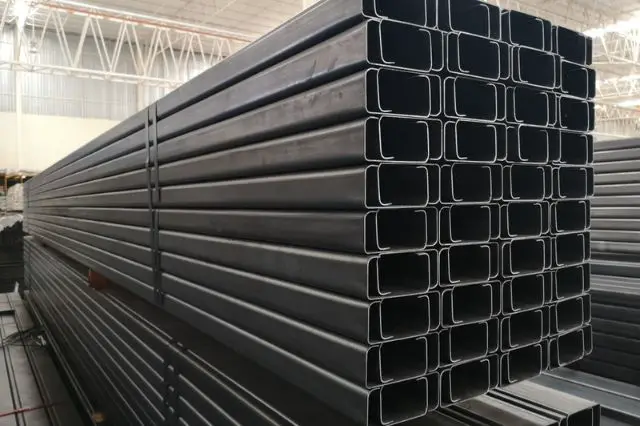Business
Efficiency and Sustainability: How Steel Sections Promote Green Construction Practices

Today, sustainability is one of the greatest concerns across a number of industries, and construction is no exception. In fact, the construction industry is a huge player in the environmental game, meaning it needs to evolve to become more eco-friendly.
In a mission to bolster energy efficiency, conserve resources, and reduce carbon emissions, a number of “green” practices are being employed in the construction sector. One of these practices is the use of steel sections, which have established themselves as key drivers of efficiency and sustainability in construction processes.
To that end, detailed below are just some of the ways in which steel sections promote green construction practices.
Steel: A Construction Staple
First and foremost, it can’t be denied that steel has been a construction staple for a number of decades. This is down to the durability and strength of steel in addition to advancing technology, which places steel as a sustainable choice for architects and builders alike. For instance, steel is highly recyclable, which is one of the main reasons for its green credentials. In fact, steel is the most widely recycled metal on a global scale, with an average recycled content of as much as 90%. As a result, builders are able to incorporate recycled steel into their projects, meaning the demand for virgin steel can be greatly reduced. From this, energy can be conserved, and greenhouse gas emissions can be minimized.
The Versatility of Steel
One thing that sets steel apart from all manner of metals is its sheer versatility. This versatility allows for efficient design and construction processes, as wastage is significantly reduced. Steel sections can be effortlessly integrated into a number of building systems due to their modular nature. As a result, faster construction can take place, which minimizes the length of time the project takes to complete. This means that costs and time are reduced; however, the environmental impact of extensive construction work is also significantly reduced. This includes transportation emissions and noise pollution.


The Efficiency of Steel
Steel allows for efficient structural designs thanks to its exceptional strength-to-weight ratios. Essentially, the use of steel sections means that the need for excessive support foundations is removed, meaning that larger structures can be created by way of fewer materials. Moreover, by reducing material consumption, spaces can be adapted more easily to accommodate changing needs.
The Durability of Steel
Being resistant to a number of factors, including pests, weathering, and corrosion, steel is one of the most durable materials that can be used. As a result, maintenance and repair won’t need to be carried out consistently, minimizing both life-cycle costs and the environmental impact. For instance, maintenance activities can lead to harsh chemicals being used, as well as the disposal of waste materials. Therefore, minimizing the need for these maintenance practices can only be a positive thing.
Energy Efficient Practices
Steel is capable of transferring cold and heat alike because of the elevated thermal conductivity of the material. As a result, energy-efficient building designs can be completed with an added focus on air conditioning, ventilation, and heating systems. In fact, these systems can be integrated into the building from the construction stages by way of steel usage. This added layer of insulation and ventilation will minimize the energy consumption of the space, which will, in turn, reduce the carbon footprint. This is on top of the reflective qualities of steel, which will reduce heat gain and minimize cooling requirements.
When it comes to maximizing sustainability and efficiency, steel sections are undeniably the way forward. Steel is the future of construction.
Finance
5 Tips to Secure the Best Interest Rates on Your Auto Loan in Canada


If you plan to purchase a vehicle soon, finding the best rate on a car loan is important and a strategic step for long-term savings. Our guide will help you understand the main points and offer solutions for obtaining favorable car loan terms in Canada, especially for Toronto residents and newly arrived Ukrainians looking for reliable financial advice.
Ways to Find the Best Rate on a Car Loan
Obtaining the lowest interest rates on a vehicle loan is a priority for anyone planning to purchase. To find advantageous lending terms, it’s advisable to focus on a reputable financial institution, bcufinancial.com, that can help you secure the best offers. Below are some helpful tips to achieve the best interest rate:
1. Analyzing Your Credit History
Before applying for a car loan, you should review your credit history and, if necessary, pay off all existing debts to establish up-to-date credit.
2. Compare Lender Offers
Before taking out a car loan, it’s worth investigating the various offers that catch your eye. Pay particular attention to the annual percentage rate (APR), which includes all loan costs, such as interest and fees. By comparing APRs, you can make an informed decision and choose a loan with a favorable total cost that meets your needs.
3. Negotiate Loan Terms
Once you’ve identified the most attractive loan options, it’s time to discuss the interest rate, payment plan, and potential additional fees with your lender. This will help minimize overall costs and find the optimal terms that best fit your budget.
4. Choose a Shorter Loan Term


By choosing a shorter loan term, you can save a lot of interest. Although the monthly payments may be higher, a more significant portion will go towards repaying the principal rather than interest, allowing you to own a vehicle faster and reducing the overall cost of the loan.
5. Save More for a Down Payment
The larger your down payment, the less you need to borrow from a lender, which reduces your debt obligations and increases the likelihood of getting more favorable loan terms. This not only eases your financial burden but also helps you build a more substantial credit history for future financial needs.
Conclusion
Securing a favorable car loan rate in Canada requires careful preparation and approach. Stable maintenance of a high credit rating and comparing offers from different lenders is essential to reducing costs and making your car purchase more enjoyable and expedited.
Finance
Home Equity Loans: Leveraging Your Home’s Value


For homeowners looking to tap into their property’s value, home equity loans present a powerful financial tool. Whether you need funds for home improvements, debt consolidation, or unexpected expenses, a home equity loan can provide the necessary capital.
This guide explores the fundamentals of home equity loans, their benefits, and essential considerations for borrowers.
Understanding Home Equity Loans
A home equity loan allows you to borrow against the equity you’ve accumulated in your home. Equity is the difference between your home’s current market value and the outstanding balance of your mortgage. Home equity loans provide a lump sum payment that is repaid over a fixed term, typically at a fixed interest rate. This stability contrasts with home equity lines of credit (HELOCs), which function more like revolving credit with variable rates.
Benefits of Home Equity Loans
Home equity loans offer several advantages that make them an attractive option for homeowners:
- Fixed Interest Rates: With a fixed interest rate, your monthly payments remain constant, making it easier to budget and plan your finances.
- Potential Tax Benefits: The interest paid on a home equity loan may be tax-deductible, depending on how the loan is used. Consult a tax advisor to understand your eligibility for these deductions.
- Access to Larger Funds: Since the loan is secured by your home, you may qualify for a larger loan amount compared to unsecured loans, allowing for more extensive projects or purchases.
- Debt Consolidation: Home equity loans can be used to consolidate high-interest debts, such as credit card balances, into a single loan with a potentially lower interest rate.
Key Considerations Before Taking a Home Equity Loan
Before applying for a home equity loan, consider the following factors to ensure it aligns with your financial goals:
- Loan-to-Value Ratio (LTV): Most lenders require an LTV ratio of 80% or lower, meaning you need significant equity in your home to qualify for a loan.
- Credit Score: A strong credit score can help you secure better interest rates and loan terms. Review your credit report and address any issues before applying.
- Repayment Ability: Consider your ability to make consistent payments, as failing to repay the loan could result in foreclosure.
- Closing Costs and Fees: Be aware of any closing costs, origination fees, or other charges associated with the loan, as these can add to the total cost.
Quick Tip:
Use an online home equity loan calculator to estimate your potential loan amount and monthly payments, helping you plan and budget effectively.
Exploring Home Equity Loan Options
Home equity loans are offered by a variety of lenders, including banks, credit unions, and online financial institutions. Here are some options to consider:
Banks and Credit Unions
Traditional banks and credit unions often provide competitive home equity loan rates and terms. These institutions offer personalized service and can help you navigate the borrowing process.
Online Lenders
Online lenders offer the convenience of applying for a loan from home. Many online platforms provide quick approvals and competitive rates, appealing to tech-savvy borrowers seeking flexibility.
Conclusion
Home equity loans offer a valuable opportunity for homeowners to access funds for various financial needs. By understanding the benefits, key considerations, and available options, you can confidently navigate the borrowing process and secure a loan that aligns with your financial goals.
Remember to research thoroughly, compare offers, and choose a reputable lender to ensure a positive borrowing experience.
Whether you’re planning to renovate your home, consolidate debt, or finance a major purchase, a home equity loan can provide the financial support you need. Explore your options and make an informed decision that suits your unique needs.
Finance
4 Reasons You Should Care about Your Credit Score


If applying for a small business loan, your credit score can make or break your chances of securing one and getting a good interest rate.
Whether starting a business, looking to expand, or requiring funds for other purposes, you may one day need a business loan. Getting the best terms possible is a priority. That’s one reason to consider your creditor score and how it’ll factor into your search for a business loan.
Here are four reasons your credit score matters. You’ll also see how to get help with credit score disputes if you can’t resolve such conflicts independently.
1. Credit Score Determines If You Get a Business Loan
If getting a business loan is a make-or-break issue for your company, you should be mindful of your credit score. Remember that lenders aren’t in the business of offering loans to people who present a substantial risk.
So, if your credit score is less than optimal, lenders could balk at lending you a loan or offer less money to reduce their risk. It’s a good idea to consider your credit score to see if you can realistically qualify for a business loan with reasonable terms.
Otherwise, you may have to explore other options to secure money for business needs. There are alternative ways to get funds. But it might mean accepting a higher interest rate or onerous terms.
2. Credit Score Affects Your Interest Rate
Even if you qualify for a business loan, you may not get a good interest rate if your credit score isn’t good. Even a few percentage points more could translate into paying back thousands more to complete your payback obligations.
You’ll have to consider whether you can afford to shoulder a high premium in interest payments to get a business loan you might not qualify for otherwise.
If forced to pay higher interest for a business loan, the lender may have other stringent terms. You should carefully consider the particulars before signing on the dotted line.
3. Credit Score Can Impact How Much You Qualify for
As was mentioned above, your credit score can influence how much a lender is willing to lend. If your credit is not good enough to grant you the amount you want, a lender may offer a business loan for a fraction of that sum.
That can happen when a lender doesn’t feel comfortable enough lending you more than a specific amount. It’s about limiting the potential fallout if you’re unable to pay your loan.
When a lender looks at your finances, it’ll know how much you can afford to pay back. If it determines you’ll struggle to pay back the amount you request, it might simply offer a lower amount more in line with your cash flow.
4. Credit Score Can Throw a Wrench in Your Business Plans
You may struggle to grow your business if you desperately need a business loan but have poor credit. In fact, you may face financial problems that threaten the long-term viability of your company. So, your credit score can make or break your business. Don’t allow bad credit to throw a wrench into your plans. If possible, improve your credit score before applying for a loan.
While a bad credit score can cause problems for your business, there are times when your credit report may include inaccurate information. Whether the credit report hasn’t been updated or includes completely false information, you may struggle to get the information corrected.
If you can’t make progress on this front, you may need to speak to a lawyer. A legal professional experienced in helping clients involved in credit score disputes can be a godsend.
-



 Captions3 years ago
Captions3 years ago341 Sexy Captions to Fire Up Your Instagram Pictures
-



 Captions3 years ago
Captions3 years ago311 Night Out Captions for Instagram and Your Crazy Night
-



 Captions3 years ago
Captions3 years ago245 Saree Captions for Instagram to Boost Your Selfies in Saree
-



 Captions3 years ago
Captions3 years ago256 Best Ethnic Wear Captions for Instagram on Traditional Dress
-



 Captions3 years ago
Captions3 years ago230 Blurred Picture Captions for Instagram
-



 Captions3 years ago
Captions3 years ago275 Deep Captions for Instagram to Express Your Thoughts
-



 Quotes3 years ago
Quotes3 years ago222 Nail Captions for Instagram to Showcase Your Fresh Manicure
-



 Captions3 years ago
Captions3 years ago211 Laughing Captions for Instagram | Laughter Is the Best Medicine







